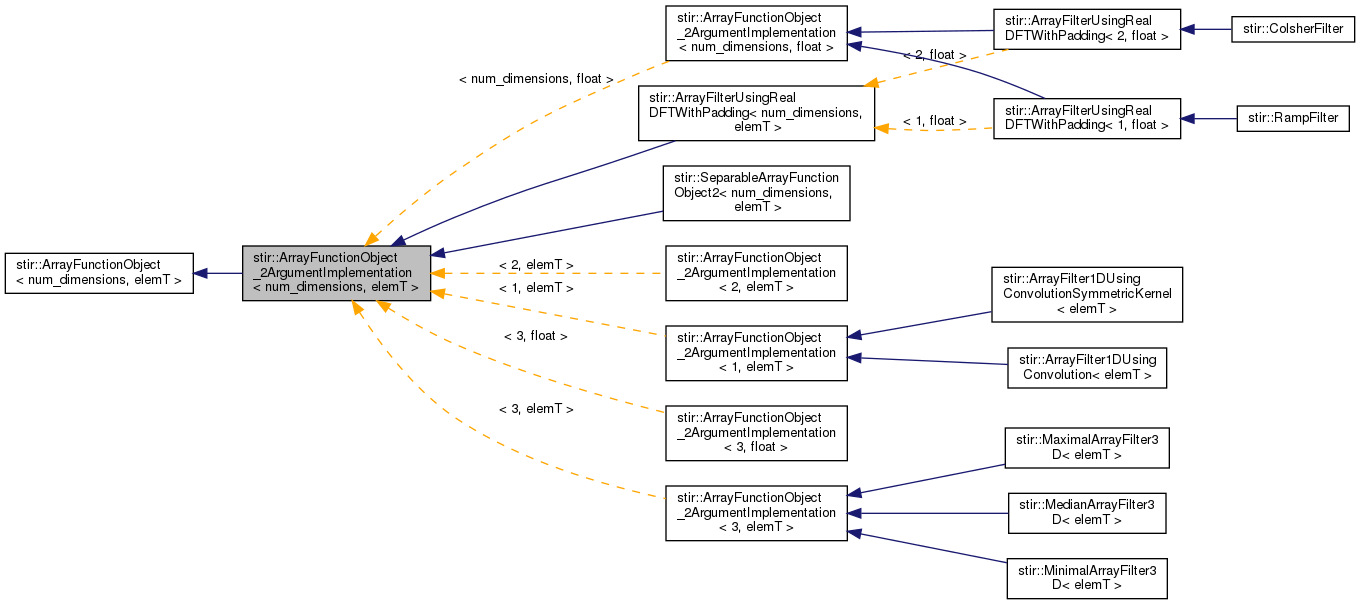A convenience class for children of ArrayFunctionObject. It implements the in-place operator() in terms of the 2 argument version. More...
#include "stir/ArrayFunctionObject_2ArgumentImplementation.h"
Inheritance diagram for stir::ArrayFunctionObject_2ArgumentImplementation< num_dimensions, elemT >:

Public Member Functions | |
| void | operator() (Array< num_dimensions, elemT > &array) const override |
| in-place modification of array, implemented inline | |
| void | operator() (Array< num_dimensions, elemT > &out_array, const Array< num_dimensions, elemT > &in_array) const override |
| result stored in another array More... | |
 Public Member Functions inherited from stir::ArrayFunctionObject< num_dimensions, elemT > Public Member Functions inherited from stir::ArrayFunctionObject< num_dimensions, elemT > | |
| virtual bool | is_trivial () const =0 |
| Should return true when the operations won't modify the object at all. More... | |
| virtual Succeeded | get_influencing_indices (IndexRange< num_dimensions > &influencing_indices, const IndexRange< num_dimensions > &output_indices) const |
| sets the range of indices that influences the result in a set of coordinates output_indices More... | |
| virtual Succeeded | get_influenced_indices (IndexRange< num_dimensions > &influenced_indices, const IndexRange< num_dimensions > &input_indices) const |
| sets the range of indices that gets influenced by a set of coordinate input_indices More... | |
Protected Member Functions | |
| virtual void | do_it (Array< num_dimensions, elemT > &out_array, const Array< num_dimensions, elemT > &in_array) const =0 |
Detailed Description
template<int num_dimensions, typename elemT>
class stir::ArrayFunctionObject_2ArgumentImplementation< num_dimensions, elemT >
A convenience class for children of ArrayFunctionObject. It implements the in-place operator() in terms of the 2 argument version.
Sadly, we need to introduce another virtual function for this, as redefining an overloaded function in a derived class, hides all other overladed versions. So, we cannot simply leave the 2 arg operator() undefined here. Similarly, we could not only define the 2 arg operator() in a derived class.
Member Function Documentation
◆ operator()()
template<int num_dimensions, typename elemT>
|
inlineoverridevirtual |
result stored in another array
- Warning
- Not all derived classes will be able to handle arbitrary index ranges in out_array and in_array.
Implements stir::ArrayFunctionObject< num_dimensions, elemT >.
The documentation for this class was generated from the following file:
- /home/sirfuser/devel/STIRdistrib/STIR/src/include/stir/ArrayFunctionObject_2ArgumentImplementation.h
 1.8.13
1.8.13